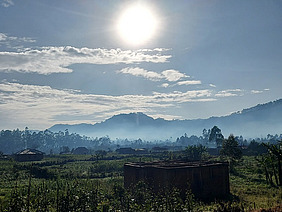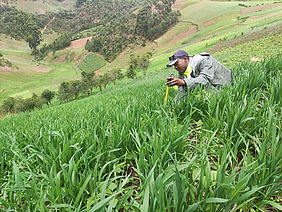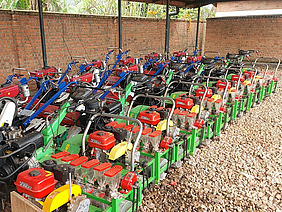In April 2025, a team from FiBL initiated a partnership with the Virunga Foundation to support sustainable agriculture in North Kivu, in the eastern Democratic Republic of the Congo (DRC). The foundation, known for managing the Virunga National Park – Africa's first national park and a vital wildlife sanctuary in conflict-affected eastern DRC – also promotes economic alternatives to illegal deforestation, cultivation, and poaching, such as agriculture and renewable energy. Revenues generated from these initiatives fund conservation efforts, including deploying 700 rangers in the National Park.
Among these activities are the organic-certified production and processing of cocoa and coffee, as well as the transformation of palm oil into soap and green fuel for the foundation's transport fleet.
Supporting smallholder farmers in wheat production
Wheat is also an important crop in North Kivu and the key focus of FiBL's partnership with the Virunga Foundation. It has been grown for nearly a century in the region's high plateaus, which offer a mild and humid climate ideal for this crop. Locally adapted wheat varieties exist, and the foundation recently invested in a mill and biscuit production line to supply the local market. Wheat is sourced from smallholder farmers, who also receive seeds and technical support. However, yields remain low, challenging profitability despite good product demand.
Improve yields, reduce labour
FiBL's primary objective is to identify the causes of low wheat yields and propose concrete improvements. A joint monitoring plan with local agronomists tracks crop growth parameters weekly. In parallel, FiBL supports the deployment of small-scale mechanisation – including motor cultivators and seeders – to reduce labour intensity. In fact, from sowing to harvesting, most tasks are currently performed manually. A locally built weeding tool designed by FiBL has already reduced weeding time and costs by a factor of ten. FiBL is also promoting the implementation of green manure crops to naturally boost soil fertility without chemical inputs. These initial improvements have already attracted strong interest from farmers.
After this season's harvest and data analysis, FiBL will issue more detailed recommendations to increase yields for the seasons to come. Located on the equator at over 1,500 meters of altitude, the region can grow cereal crops twice per year, which gives a lot of potential for this production.
Expanding crop focus for long-term impact
This pilot phase will lead to a long-term collaboration, as a second phase of the project is jointly elaborated for 2026-2028. FiBL will continue its work on wheat while extending its focus to the region's two other main crops: potatoes and beans. Field trials will further refine the use of green manures, while training programmes, digital tools, and on-site demonstrations will help local agronomists promote broader adoption amongst the 2,000 farmers engaged in these value chains.
Further information
Contact
Links
- fibl.org: The project in the FiBL project database
- virunga.org: Website of the Virunga National Park






